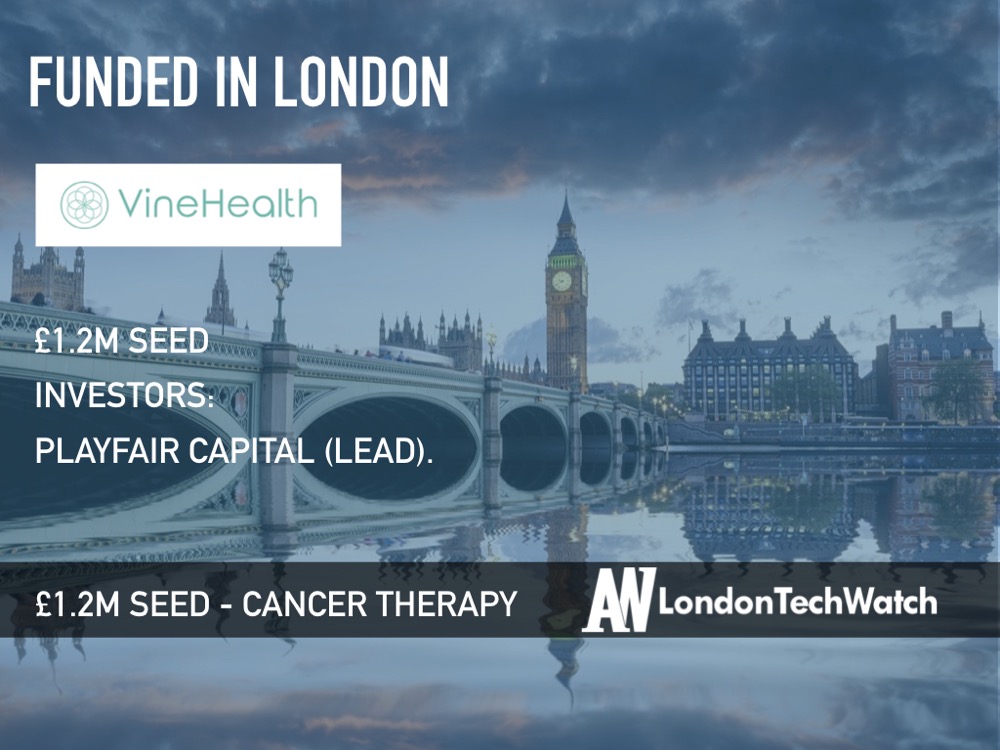Vine Health is the digital app that allows cancer patients to track, understand, and optimize their care. During treatment, patients can use this app to log their symptoms and reactions to various medications, which gives Vine Health the ability to capture large-scale data on how different drugs affect patients’ quality of life.
London TechWatch spoke with founder Rayna Patel about creating the behavioral science platform that will help advance the development of cancer therapeutics.
Who were your investors and how much did you raise?
Seed round of £1.2M, led by Playfair Capital.
Tell us about the product or service Vine Health offers.
Vine Health’s platform uses behavioural science and AI to increase the quality of life and survival of cancer patients. The Vine mobile app allows patients to track, understand, and optimise their care, allowing them to feel in control and better self-manage. Through this, the platform generates crucial real-world data to inform healthcare delivery and drug development.
What inspired you to start Vine Health?
It is becoming increasingly clear that behaviours, lifestyles, and daily decisions that patients are making about their health account for up to 50% of their outcomes from serious and long-term illnesses such as cancer.
The experience of seeing people living with cancer go through this bewildering and complex process led my cofounder and I to start exploring the enormous potential of technology to solve this problem.
The current, available solutions on the market are not built with the patient in mind. They’re complex, difficult to understand, and take a lot of effort. Our goal is to make it as simple as possible to understand your cancer treatment.
What market is Vine Health targeting and how big is it?
We are aiming to optimize the delivery of cancer services and development of cancer therapeutics, a market estimated to be worth at least $200B globally.
Who do you consider to be your main competitors?
Although a number of basic symptom trackers exist, we believe no product has managed to successfully marry a true patient-first approach with the clinical complexities of cancer care.
What’s your business model?
We generate population-level real-world data to support cancer service delivery and drug development.
What was the funding process like?
We genuinely enjoyed going out and speaking to smart people about the vision we believe in. It was challenging and exhausting at times, but it ultimately led to even greater belief in what we’re trying to achieve.
What are the biggest challenges that you faced while raising capital?
Healthcare remains a relative unknown to many investors, and the complexity of cancer care means that there is a huge amount of information to convey. Doing this simply and succinctly can be really tricky.
What factors about your business led your investors to write the check?
We chose to take funding from investors who really believe in the positive impact of our product for people living with cancer, and those who really believed in Georgina and I as cofounders.
What are the milestones you plan to achieve in the next six months?
Our priority is launching a product that people with cancer really need and want. We’re already working with a number of cancer clinics and hospitals and hope to grow this network over the next 6 months.
What advice can you offer companies in London that do not have a fresh injection of capital in the bank?
To be really focused on what’s most important; take the time to understand where the biggest risks in the business are and how can they be mitigated. It’s easy to focus on the areas where you’re already making progress but that’s often not where your efforts are most needed.
Take the time to understand where the biggest risks in the business are and how can they be mitigated. It’s easy to focus on the areas where you’re already making progress but that’s often not where your efforts are most needed.
Where do you see the company going now over the near term?
We’re really excited to now have the funding to build a team, develop our product and put it in the hands of those who need it.
What is your favorite restaurant in London?
Anything in Brixton Village.






